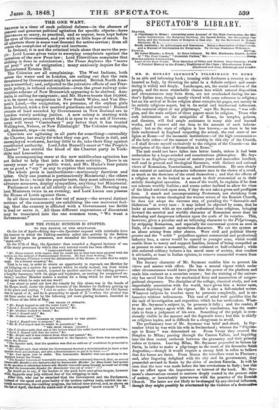HOW THE PUBLIC BUSINESS IS STOPPED..
TO THE EDITOR OF THE SPECTATOR.
On the 1st of April—fitting day—the Spectator exposed with inimitable force the manner in which the Talking-machine called into activity by the Reform Bill had brought its promoters, now miscalled the Government, to a perfect "stand-still."
On the 27th of May, the Spectator thus recorded a flagrant instance of one tithe many processes by which this very natural result has been effected.
" PARLIAMENTARY REFORM.
"Mr. Hume stated, with regret, that he could not at that late hour proceed with hls motion on the subject of Parliamentary Reform. He bad been waiting," &c.
"Mr. Feargus O'Connor moved the adjournment of the House, In order that he might speak. On a former occasion," &c. That is to say, in order to create an opportunity to reproach one Member for not bringing on a motion for a matter which he really desired, but from which he had been virtually ousted, (ousted by another exercise of the talking-power- a lengthy harangue, with its quips and rejoinders, on moving for unopposed re- turns,) another Member makes a motion for a thing which he does not want, and upon which he says not one word! I was about to point out how the remedy for this abuse was in the hands of the House itself, under the simple formula of the Member for Sudburygetting up in his plate and saying, " I rise to order: the honourable Member for Old Sarum rose to speak of A, and he is proceeding to speak of X "—when the ground was cut from under my feet by the following yet more glaring instance, recorded in the Times of the 80th of May
" THE TRIALS IN IRELAND.
"Mr. Keogh begged to call the noble Lord," &c. " Lord J. Russell said, that he had received," &c. "Mr. Grattan wished to know," &c.
" Lord J. Russell said," &e.
"Mr. Grattan said," &c.
" ADDRESS OF CONDOLENCE TO THE QUEEN.
" Lord J Russell rose to propose," &c. "Sir R. Peel hoped that he might be permitted," &e.
" THE IRISH TRIALS. [AGAIN.]
"Sir J. Graham said, that one of the lettere which the noble Lord read contained," &c. "Lord J. Russell said that the letter," &c.
"Mr. Bright said it was evident faun what had passed," &e. "Mr. Law rose to order. He submitted to the Speaker, that there was no question• before the House.
"The Speaker said, that the question was that an address of condolence be presented to her Majesty. " Mr. Bright said, that whilst the Government showed a determination to have a law against these proceedings, and also a determination to put it in force —" "Arr. Law again rose to order. The honourable Member was not speaking to the question before the House.
"The Speaker [durum et venerabile nomen, rubesco re(erens] observed, that, as several honourable Members who had preceded the honourable Member for Manchester had spokes 0/1 the guestMrs to whichtkat lwarnsrable Member was addressing &well, he could not strictly le that the honourable Member for Manchester was out of order." I I t As much as to say, if the leaders of the pack have once given tongue, however Wild, laggards may yelp without fear of the whipping-in lash. After this, who can be surprised that the Government and the Parliament, instead of the speed and punctuality of the modern railway train, exhibit the un- couth movements, the crawling progress, the behind-time arrival, and, as shown on the 1st of Apnl, the dead-fix stand-still of the antiquated "SLOW COACH "? H.


























 Previous page
Previous page